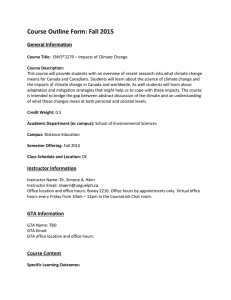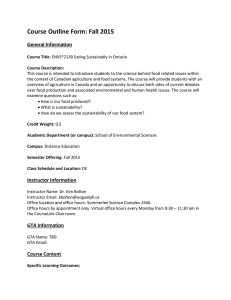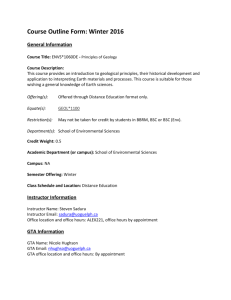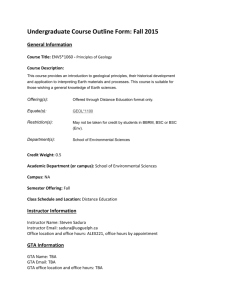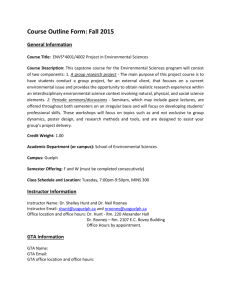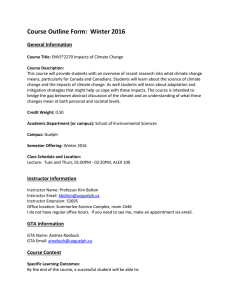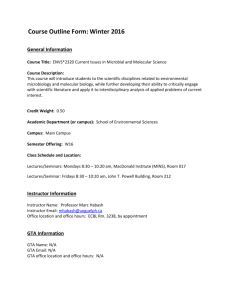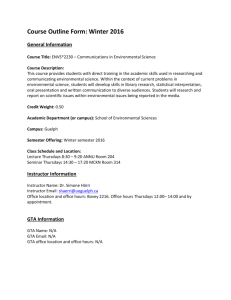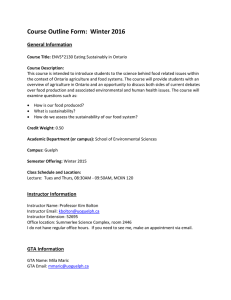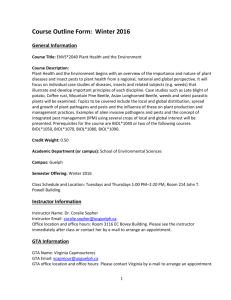ENVS*4210 Meteorological and Environmental Instrumentation
advertisement
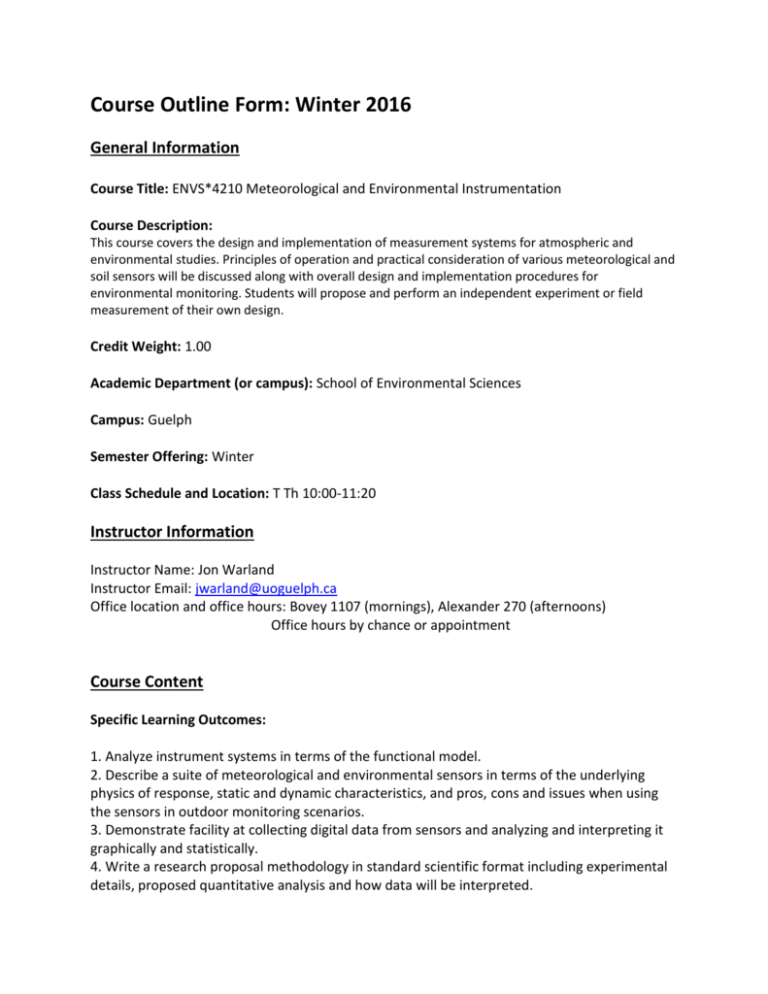
Course Outline Form: Winter 2016 General Information Course Title: ENVS*4210 Meteorological and Environmental Instrumentation Course Description: This course covers the design and implementation of measurement systems for atmospheric and environmental studies. Principles of operation and practical consideration of various meteorological and soil sensors will be discussed along with overall design and implementation procedures for environmental monitoring. Students will propose and perform an independent experiment or field measurement of their own design. Credit Weight: 1.00 Academic Department (or campus): School of Environmental Sciences Campus: Guelph Semester Offering: Winter Class Schedule and Location: T Th 10:00-11:20 Instructor Information Instructor Name: Jon Warland Instructor Email: jwarland@uoguelph.ca Office location and office hours: Bovey 1107 (mornings), Alexander 270 (afternoons) Office hours by chance or appointment Course Content Specific Learning Outcomes: 1. Analyze instrument systems in terms of the functional model. 2. Describe a suite of meteorological and environmental sensors in terms of the underlying physics of response, static and dynamic characteristics, and pros, cons and issues when using the sensors in outdoor monitoring scenarios. 3. Demonstrate facility at collecting digital data from sensors and analyzing and interpreting it graphically and statistically. 4. Write a research proposal methodology in standard scientific format including experimental details, proposed quantitative analysis and how data will be interpreted. 5. Explain and demonstrate linear and non-linear calibration of an instrument. 6. Define and use common terminology in instrumentation including concepts such as resolution, bias, time constant, precision, frequency response, and so forth. 7. Present experimental results and methods in scientific format including text, figures, captions and statistical descriptors. Lecture Content: Week Topic Reading 1 Course introduction, calibration, sensor model, barometry Chapters 1 & 2 2 Thermometry and static performance characteristics Chapters 3 & 4 3 Scientific writing and graphical presentation of data handout 4 Energy balance of thermometer, atmospheric water, hygrometery Chapter 5 5 Dynamic performance characteristics Chapter 6 6 Anemometry and precipitation Chapters 7 & 9 7 Radiation and data management Chapter 10 8 Heat pulse probes and soil thermal properties handout 9 Analog-to-digital conversion (ADC) Chapter 13 10 Trace gas measurement and eddy covariance flux measurement handout 11 & 12 Student-driven topics, work on labs and final projects Course Assignments and Tests: Assignment or Test Contribution to Final Mark (%) Due Date Learning Outcomes Assessed Chapter 2, problems 1, 2, 4, 8, 12, 17, 19 Chapter 3, problems 1, 2, 4, 7, 8, 9, 11, 16, 17 Chapter 4, problems 2, 8, 9, 13, 14, 20 Chapter 5, problems 1, 2, 4, 5, 15, 23 Chapter 6, problems 1, 3, 4, 5, 12, 13, 15 Chapter 7, problems 2, 3, 4, 7, 9, 15 Chapter 9, problems 1, 2, 3, 5, 7, 10, 12, 13 Chapter 10, problems 1, 3, 4, 7, 8, 14 Chapter 13, problems 1, 2, 11, 12, 19 3% 126 3% 156 3% 126 3% 1256 3% 256 3% 126 3% 256 3% 126 3% 26 Lab 1: Calibration of Thermistor 10% 123567 Assignment or Test Labs 2, 3 & 4: Student choice Final project proposal DRAFT Final project proposal FINAL Contribution to Final Mark (%) Due Date 30% Learning Outcomes Assessed 13567 46 3% 46 5% Final project report 13567 25% Additional Notes (if required): Several labs are provided for students to use for Labs # 2, 3 and 4. Students may choose from these, or create their own lab exercise in consultation with the instructor. Final examination date and time: None Course Resources Required Texts: 'Meteorological Measurement Systems' by Brock and Richardson. There are two copies on 2 hour reserve, and copies for sale at the bookstore. Recommended Texts: Guide to Meteorological Instruments And Methods of Observation WMO-No. 8, available at http://www.wmo.int/pages/prog/www/IMOP/CIMO-Guide.html Lab Manual: Other lab material to be handed out in class and posted on CourseLink. University Policies Academic Consideration: The University of Guelph is committed to supporting students in their learning experiences and responding to their individual needs and is aware that a variety of situations or events beyond the student's control may affect academic performance. Support is provided to accommodate academic needs in the face of personal difficulties or unforeseen events in the form of Academic Consideration. Information on regulations and procedures for Academic Consideration, Appeals and Petitions, including categories, grounds, timelines and appeals can be found in Section VIII (Undergraduate Degree Regulations and Procedures) of the Undergraduate Calendar. Academic Misconduct: The University of Guelph is committed to upholding the highest standards of academic integrity and it is the responsibility of all members of the University community, faculty, staff, and students to be aware of what constitutes academic misconduct and to do as much as possible to prevent academic offences from occurring. University of Guelph students have the responsibility of abiding by the University's policy on academic misconduct regardless of their location of study; faculty, staff and students have the responsibility of supporting an environment that discourages misconduct. Students need to remain aware that instructors have access to and the right to use electronic and other means of detection. Please note: Whether or not a student intended to commit academic misconduct is not relevant for a finding of guilt. Hurried or careless submission of assignments does not excuse students from responsibility for verifying the academic integrity of their work before submitting it. Students who are in any doubt as to whether an action on their part could be construed as an academic offence should consult with a faculty member or faculty advisor. Detailed information regarding the Academic Misconduct policy is available in Section VIII (Undergraduate Degree Regulations and Procedures) of the Undergraduate Calendar. Accessibility: The University of Guelph is committed to creating a barrier-free environment. Providing services for students is a shared responsibility among students, faculty and administrators. This relationship is based on respect of individual rights, the dignity of the individual and the University community's shared commitment to an open and supportive learning environment. Students requiring service or accommodation, whether due to an identified, ongoing disability or a short-term disability should contact the Student Accessibility Services (SAS), formerly Centre for Students with Disabilities (CSD), as soon as possible. For more information, contact SAS at 519-824-4120 ext. 56208 or email sas@uoguelph.ca or visit the Student Accessibility Services website (http://www.uoguelph.ca/csd/). Course Evaluation Information: End of semester course and instructor evaluations provide students the opportunity to have their comments and opinions used as an important component in the Faculty Tenure and Promotion process, and as valuable feedback to help instructors enhance the quality of their teaching effectiveness and course delivery. While many course evaluations are conducted in class others are now conducted online. Please refer to the Course and Instructor Evaluation Website for more information. Drop period: The drop period for single semester courses starts at the beginning of the add period and extends to the Fortieth (40th) class day of the current semester (the last date to drop a single semester courses without academic penalty) which is listed in Section III (Schedule of Dates) of the Undergraduate Calendar. The drop period for two semester courses starts at the beginning of the add period in the first semester and extends to the last day of the add period in the second semester. Information about Dropping Courses can be found in Section VIII (Undergraduate Degree Regulations and Procedures) of the Undergraduate Calendar. Additional Course Information None
